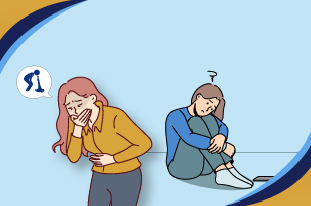Eating disorders drastically change a person’s perception of their body and eating patterns. They can severely affect a person’s physical health and significant areas of life. Furthermore, there can be several leading factors triggering the onset of eating disorders.
This blog provides all the necessary details about eating disorders, their causes, why people have eating disorders, what are the symptoms of an eating disorder, and available treatment options.
What Is An Eating Disorder?
Eating disorders are severe mental and physical conditions that are characterized by deficits in how a person thinks about food, eating, physical activity, and body image. An eating disorder affects 20 Million women and 10 Million men in the American population. It is limited to a particular age group, ethnic origin, class, religion, gender, etc.
What Are The Different Types Of Eating Disorders?
Even though eating disorders are referred to as a single category, it is not; it belongs to more than one disease category. The following are the most commonly experienced types of eating disorders:

Anorexia Nervosa:
Anorexia nervosa comprises the following signs:
- Severely restricted intake of calories. Additionally, it can also include avoiding particular types of food.
- Extreme fear of weight gain.
- Deformed body image
One has to be aware of the fact that thinness is not enough to assume that a person has an eating disorder. In atypical anorexia, for instance, a person may not be underweight despite losing weight.
Anorexia is formally categorized into two types: the restricting type and the binge eating and purging type.
Individuals with the restricting type lose weight solely through dieting, fasting, or extra exercises.
In binge eating and purging, individuals eat huge portions or take very few meals. In purging, it may involve vomiting, use of laxatives, diuretics, or exercising inappropriately.
Bulimia Nervosa:
People with bulimia are usually observed to take large quantities of food at a time. That is why it is often referred to as binge eating. A binge-eating episode ends when a person gorges and gets to the point of being uncomfortably full. In the case of binge eating, people feel that they cannot quit eating or manage the portions consumed.
A binge behavior can occur with any food, but it most often concerns food an individual tries to avoid. The affected ones also try to vomit after they have taken too many foods to minimize the calories that have been affected by the different foods.
Some of the common purging behaviors include:
- Forcefully vomiting
- Fasting often
- Using laxatives
- Using diuretics
- Use of enemas
- Excessive exercise
Signs of bulimia nervosa can sometimes be confused with binge eating or purging due to the similarity of symptoms.
Binge Eating Disorder:
Binge eating disorder is an eating disorder characterized by eating large amounts of food in a short period until one feels uncomfortably full. Distress and later the feeling of shame and guilt come afterward as a result of the binge eating pattern.
BED comes with symptoms that would seem like those of bulimia or the binge eating subtype of anorexia. This involves behaviors of eating a lot of food in the shortest time possible or having unmanageable food portion pangs. One main difference is that BED does not include purging behaviors such as vomiting or excessive exercise after binging.
Pica:
It is a type of eating disorder that involves the consumption of substances that are not even considered foods. Moreover, these substances are not known to offer any nutritional value in the consumption process. Additionally, the behavior of eating non-food items is not part of someone’s culture or religion.
This may include:
- Ice
- Dirt
- Soap
- Paper
- Hair
- Wool
- Cloth
- Chalk
- Pebbles
- Detergent
Rumination Disorder:
Rumination Disorder is characterized by the fact that an individual occasionally vomits a bit of the food they have chewed and swallowed, then chews it again and either spits it out or Swallows it. This is usually experienced thirty minutes after taking a meal.
It manifests in young infants between 3 – 12 months and vanishes independently. In children and adults, whenever they engage in a battle with this particular mental health condition, therapy can cure it.
In cases where it is not treated on time, rumination disorder leads to weight loss severe enough that it causes malnutrition. At other times, it is a significant cause of mortality in certain patients.
Avoidant/Restrictive Food Intake Disorder:
People with AFRID are either unable to feel like consuming food or even contaminated by the smell, taste, color, texture, or temperature.
Some of the common signs are:
- Avoiding or restricting certain food items that prevent the person from attaining the nutrition and calories.
- Eating habits that can impact the typical social functions of the affected person include eating with others.
- Noticeable weight loss, poor development for age and height.
- Nutrient deficiencies or complete dependency on the supplements.
What Are The Causes Of Eating Disorders?
There can be some common risk factors for eating disorders, such as:
Genetic Predispostion:
If there is a strong family history of eating disorders, then there is a high risk of developing it due to high genetic factors of eating disorders.
Psychological Factors:
Mental health issues such as low self-esteem, perfectionism, anxiety, and depression are positively linked with the onset of eating disorders.
Socio-cultural influences:
The societal expectations from people regarding an ideal body shape/size, media, and culture are some of the leading causes for the development of eating disorders.
What Are The Risk Factors Of Eating Disorders?
Trauma:
Eating disorders are usually a result of physical and emotional abuse, bullying, or significant life changes.
Dieting and Body Dissatisfaction:
Sticking to restrictive dieting or having a distorted perception of body size can lead to the development of disordered eating behaviors.
Peer pressure:
Pressure from peers to have specific body standards can be a significant reason for the onset of eating disorders.
How Are Eating Disorders Treated?
Treating eating disorders varies and depends on the type and specific needs of a person. The most common treatments include:
Psychotherapy:
Seeking help from a mental health expert can help you identify the best psychotherapy for your situation. Several individuals suffering from eating disorders show improvement with the help of cognitive behavioral therapy. The primary focus of such treatment is to help you understand the distorted thinking and change it into pleasant ones. Additionally, a mental health professional allows you to learn various coping skills to manage the negative signs of eating disorders.
Maudsley Approach:
This is a type of treatment that helps parents of teenagers with anorexia to understand their kids better. Furthermore, parents actively guide and monitor their children’s eating patterns while they learn healthier habits.
Psychiatric medications:
Some individuals with eating disorders also have other conditions, such as anxiety or depression. To overcome the signs of other co-occurring mental health conditions, anti-depressants are the best options.
Nutrition Counseling:
A professional and experienced dietitian can help you improve your negative eating habits and develop nutritious meal plans. They can also assist you in understanding what food to buy while shopping and what not to.
Summary!
Eating disorders are complex mental and physical illnesses that impact multiple aspects of a person’s life, irrespective of age, race, or gender. Some of these include anorexia nervosa, bulimia nervosa, and binge eating disorders, and each has different symptoms, and globally, they are of varying intensity. These are disorders that are dispositions of genetic, psychological, and socio-cultural factors, and they are so complicated and severe that they may require psychotherapy, medications, and nutritional counseling. It, therefore, requires timely notice and immediate medical treatment to be controlled and treated successfully. If you are also looking for a reliable mental health platform to overcome the signs of an eating disorder, then you are in the right place. Orange Coast Psychiatry is an ideal choice for you to regain the long-lost mental and physical stability due to eating disorders. So, wait no more and get in touch with us to experience the goodness of mental health treatments available at Orange to manage the signs of eating disorders.

















